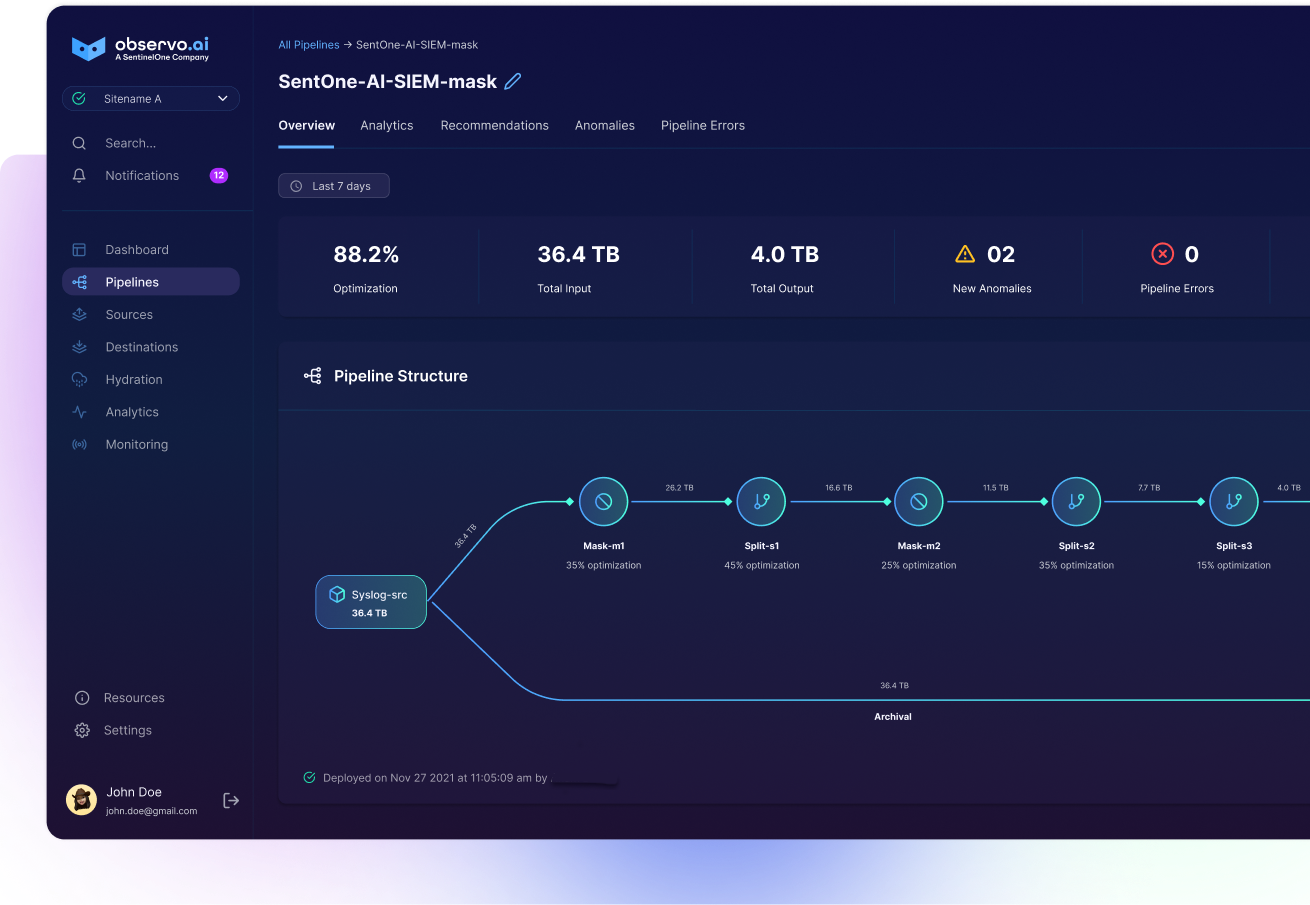Observability 101: Log Retention Requirements for Regulatory Compliance

Introduction
Organizations generate and store massive amounts of data, including logs, which are essential for monitoring and ensuring the security and compliance of their systems and applications. Various regulatory frameworks, such as PCI DSS, HIPAA, Sarbanes-Oxley, GDPR, and CCPA, impose stringent requirements on log retention and management. This blog will delve into the log retention requirements mandated by these regulations and discuss the challenges organizations face in meeting them. We will also explore how observability pipelines, like Observo.ai, can help ease the burden of log retention for compliance purposes.
The Importance of Log Management and Retention
Logs, also known as telemetry or security event logs, provide organizations with a wealth of information about their IT environments. These logs capture critical data about system activities, user interactions, and security incidents. Effective log management and retention are essential for several reasons:
- Compliance: Regulatory bodies require organizations to maintain comprehensive logs to demonstrate compliance with various laws and standards. Non-compliance can result in hefty fines and legal consequences.
- Security: Logs are a vital component of an organization's security strategy. They can be used to detect and investigate security incidents, identify vulnerabilities, and monitor user activity to prevent unauthorized access.
- Troubleshooting: Logs are invaluable for diagnosing and resolving technical issues. They provide a detailed record of events leading up to problems, helping IT teams pinpoint the root cause.
- Performance Monitoring: Logs can be leveraged for performance monitoring and optimization. Analyzing logs helps organizations identify bottlenecks, optimize resource utilization, and ensure optimal system performance.
Key Log Retention Requirements for Regulatory Compliance
Different regulations impose specific log retention requirements. Here are some of the key requirements for PCI DSS, HIPAA, Sarbanes-Oxley, GDPR, and CCPA:
PCI DSS (Payment Card Industry Data Security Standard):
- PCI DSS requires organizations to retain audit trail logs for at least one year.
- Logs should capture all access to cardholder data and should not be alterable.
- Organizations must implement log reviews and alerts to detect and respond to security incidents promptly.
HIPAA (Health Insurance Portability and Accountability Act):
- HIPAA mandates the retention of audit logs for a minimum of six years.
- Logs should track access to electronic protected health information (ePHI).
- Organizations must regularly review logs and implement access controls to protect patient data.
Sarbanes-Oxley (SOX):
- SOX regulations dictate that financial institutions must retain relevant records, including logs, for a minimum of seven years.
- Logs should cover financial transactions, access to financial systems, and any changes to critical financial data.
- Strict controls and monitoring should be in place to prevent unauthorized access to financial systems.
GDPR (General Data Protection Regulation):
- GDPR requires organizations to retain logs related to personal data processing activities.
- Logs should be kept for a reasonable period, with no specific duration mentioned.
- Organizations must have the ability to produce logs as evidence of compliance.
CCPA (California Consumer Privacy Act):
- CCPA mandates the retention of logs related to consumer data processing for a minimum of 12 months.
- Logs should include information about data access and requests from consumers.
- Organizations must promptly respond to consumer requests for their data logs.
Challenges with Log Retention for Compliance
Meeting log retention requirements for regulatory compliance can be challenging for organizations due to several factors:
- Data Volume: The sheer volume of logs generated by modern IT environments can be overwhelming. Managing and storing these logs efficiently becomes a significant challenge.
- Data Retention Periods: Different regulations specify varying retention periods, making it challenging to manage logs that need to be retained for different durations.
- Log Security: Logs contain sensitive information, and ensuring their security and integrity is crucial. Unauthorized access or tampering can lead to compliance violations.
- Scalability: As organizations grow and expand their digital presence, log management systems need to scale to accommodate increasing volumes of log data.
- Log Complexity: Logs can be diverse in format and content, making it difficult to standardize and analyze them effectively.
Leveraging Observability Pipelines for Compliance
Observability pipelines, such as Observo.ai, can significantly ease the burden of log retention for compliance purposes. These pipelines leverage cloud resources, like AWS S3, to create data lakes and offer several advantages:
- Scalability: Observability pipelines can automatically scale to handle large volumes of log data, ensuring that organizations can meet regulatory retention requirements.
- Data Lake Architecture: By storing logs in an observability data lake, organizations can efficiently organize and manage their log data, making it easier to retrieve and analyze when needed.
- Data Retention Policies: Observability pipelines allow organizations to define and enforce data retention policies, ensuring that logs are retained for the required durations and automatically purged when no longer needed.
- Centralized Management: Observability pipelines provide centralized management and monitoring of log data, simplifying compliance efforts and ensuring the security of log files.
- Advanced Analytics: These pipelines often include AI and machine learning capabilities that can analyze logs for anomalies, security threats, and performance issues, aiding organizations in proactively addressing compliance concerns.
Conclusion
Log retention requirements for regulatory compliance are crucial for organizations across various industries. Failure to meet these requirements can result in severe consequences, including financial penalties and reputational damage. Managing and retaining logs efficiently can be a complex and resource-intensive task, but observability pipelines like Observo.ai offer a solution by creating data lakes on commodity storage platforms like AWS S3 and Microsoft Azure.
By leveraging observability pipelines, organizations can streamline log management, ensure compliance with regulatory requirements, and enhance their overall telemetry and observability capabilities. In an era where data security and regulatory compliance are paramount, investing in robust log retention solutions is not just a best practice; it's a necessity for maintaining trust and safeguarding sensitive information.




